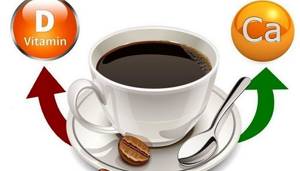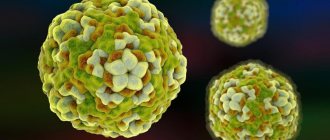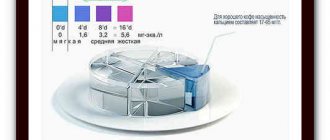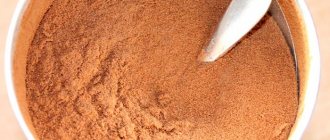Calcium is one of the most important microelements for our body. The strength of bones, teeth, nails, the beauty of hair, skin - everything depends on calcium. It regulates blood clotting processes and is needed for the absorption of other minerals and vitamins. We all know that a lot of calcium is found in dairy products - for example, in cottage cheese. But often we don’t think about the fact that there are foods that can inhibit the absorption of calcium or even begin to wash away the beneficial microelement from the body. Anna Ivashkevich, nutritionist, clinical psychologist-dietitian, member of the National Association of Clinical Nutrition, told us about the intricacies of calcium absorption and what negatively affects this absorption :
Many microelements are important for the human body. Calcium is one of them. Most of it is found in bone tissue and tooth enamel. Calcium performs the following functions:
- participates in the process of blood clotting;
- regulates a variety of universal intracellular processes - muscle contraction, exocytosis, including the secretion of hormones and neurotransmitters;
- participates in the regulation of metabolism and functions of the endocrine system.
A lack of calcium can lead to disruption of the heart muscle, hypertensive crisis, seizures and other complications.
Dangerous couple. Calcium and vitamin D are useful, but... harmful? More details
Provides calcium
Dairy products must be present in the diet - they contain a large amount of calcium, even children know this. It is recommended to consume cottage cheese, fermented baked milk, and kefir at least once a day.
Next on our list are:
- cereals, including whole grain bread and buckwheat;
- legumes and peas;
- oranges;
- greenery;
- nuts;
- oatmeal;
- dried apricots, raisins and other dried fruits;
- persimmon;
- bananas;
- green tea.
You can check the level of calcium in the body in absolutely any clinic. This procedure is called a biochemical blood test for calcium.
It is advisable to eat foods containing calcium in the first half of the day, best in combination with vitamin D.
The effect of coffee on the amount of calcium in the human body

Caffeine, which is part of the popular drink, is a derivative of purine. This substance prolongs and enhances the effect of the stress hormones histamine and adrenaline. Getting into the blood, caffeine disrupts the acid-base balance of the body, increasing it towards acidity. To restore the previous balance, it is necessary to release a certain amount of calcium from the bones. Then it is eliminated from the human body naturally.
Drinking one cup of coffee releases 40 mg of calcium. Caffeine also complicates the absorption of calcium in the intestines, causing bloating, flatulence, and in some cases even diarrhea. Therefore, it can be difficult for coffee lovers to compensate for the deficiency of this element in the body.
Consumption standards
They are different for everyone. For example, men need to consume 1 to 2.5 g of calcium every day, but after 50 years, daily intake can be reduced to 1.8 g. Women aged 18 to 50 years need to consume 2.5 g of calcium, and after 50 - reduce to 1.5 g per day.
Article on the topic
Is it possible to take calcium and magnesium supplements together?
Calcium requirements are directly related to increased bone mass and density, as well as rapid growth.
Coffee and calcium metabolism
A separate field of science studies nutrition and the mechanisms of the influence of foods on the human body. According to research, excessive coffee consumption can lead to calcium deficiency. Let's try to describe the complex mechanism of chemical reactions in understandable language.
- Don't miss: What happens if you drink coffee every day
So, after a cup of coffee, the following processes are launched in the body:
- There is a shift in the natural acid-base balance, and the pH level in the gastric environment increases. Due to the increased acid content, calcium begins to be released to compensate for the lack of microelements. Once in an acidic environment, Ca is no longer absorbed back, but leaves the body naturally. Thus, coffee leaches calcium from the bones, plus it interferes with its absorption.
- Caffeine provokes the release of adrenaline, which causes cells to need additional calcium. Having encountered a deficiency of this substance in the blood, the body begins to pull it out of the bone tissue. In addition, coffee stimulates the release of another hormone – histamine. Elevated histamine levels cause the excretion (in urine) of magnesium. And magnesium helps calcium to be better absorbed.
- A well-known, proven property of the invigorating drink is its strong diuretic effect. Frequent urination leads to the fact that calcium, along with other valuable elements, comes out, almost without having time to be absorbed.

Conclusion: Caffeine causes unnatural hormonal activity and acid-base imbalance. As a result, coffee leaches calcium from the human body and prevents the macronutrient from being absorbed in the gastrointestinal tract.
Lash out calcium
Let me make a reservation right away that no one is saying that the following foods should be excluded from your diet; it is important to maintain moderation.
Palm oil . It interferes with the absorption of calcium, it generally reduces the degree of absorption of many useful substances. Palm oil caused serious problems with baby food about 10 years ago. At that time, rickets, a disease associated with a lack of vitamin D, was spreading in one of the CIS countries. This vitamin helps absorb calcium, and calcium affects bones. The children were given calcium and vitamin D, but this did not help. Research has shown that the whole problem was in large quantities of palm oil, which was included in infant formula and interfered with the absorption of vitamins and minerals.
Palm oil is now used in a very large number of products, often in dairy products, baked goods, and confectionery products.
It is possible that the increase in the number of spinal pathologies in children and a large number of scoliosis are associated precisely with the presence of palm oil in the diet.
Coffee . Drinking large amounts of coffee removes calcium from the body, and other minerals too. If you love coffee, then it is advisable to introduce more protein, calcium-containing foods into your diet - for example, dairy products, sesame (although it is not completely absorbed, it contains a lot of calcium). If we talk about cottage cheese, then preferably no more than 5% fat content. Previously, it was believed that calcium and vitamin D were absorbed together with fatty foods, but modern studies have proven that with low-fat cottage cheese the absorption percentage is higher.
As for the amount of coffee, approximately 4 cups per day is acceptable. I'm talking about 30ml espresso cups. If you drink more espresso shots per day, you already run the risk of worsening your bone health.
Sweets . Sugar interferes with calcium absorption. If you eat a large amount of sweets, your intestinal microflora is disrupted, and all beneficial substances are absorbed in the intestines.
The amount of sweets equivalent to 2 slices of cake per day becomes problematic. That is, if you drank a glass of soda (which has a lot of sugar) and ate a cake, you have already harmed yourself. Let us remember that buns and cakes often also contain palm oil, resulting in double harm to the body.
Related news
Scientists: Calcium abuse increases risk of death in women
Sweet sparkling water . As I already said, it contains a lot of sugar. And this interferes with intestinal function. Soda generally creates a pathogenic dysbacterial environment in the intestines, and it is extremely difficult to absorb anything useful there. Some carbonated drinks contain caffeine and remove nutrients from the body, just like coffee.
In addition, animal fats (beef, for example), foods containing large amounts of salt, as well as alcoholic drinks, even low-alcohol ones such as beer or cider, negatively affect the absorption of calcium. If you drink them regularly, in noticeable quantities, you are harming yourself and leaching calcium from your body.
Does coffee flush calcium from the body: mechanism of action
By drinking coffee, you unnaturally shift the balance of acids and alkalis in the body, increasing the pH of the gastric environment. A high level of acidic compounds in the body provokes the release of Ca (calcium) reserves to compensate for the deficiency of microelements. Once in an acidic environment, calcium is not absorbed and is excreted from the body naturally.
Caffeine is not only found in coffee. In addition to this drink, it is unsafe to drink large quantities of tea and carbonated water, in which the concentration of the substance is even greater than in coffee.
This element not only promotes the rapid removal of calcium from the body, but also prevents its absorption in the intestines.
Important!
If a person does not eat properly and consumes, in addition to coffee, other products that help wash out calcium salts, or eats food with phosphoric acids, then the body suffers from calcium deficiency, which contributes to the development of serious diseases such as osteoporosis, atherosclerosis, diabetes mellitus and others. But calcium deficiency can be easily compensated by eating foods with missing trace elements or supplements containing calcium, magnesium and zinc, which promote proper absorption of minerals.

On a note!
To reduce the negative effects of coffee, drink a drink with lemon added.
Coffee removes calcium from the body - this is true. But a much more serious danger lies in poor nutrition. Don’t rush to give up this drink - start by analyzing your diet. Adjust it and take only healthy and wholesome foods, rich in all the substances the body needs. By eating right and replenishing your calcium supply in the required amount, you can allow yourself black coffee for breakfast every day, which in no way can harm the calcium balance of the body.
Starvation
Nowadays it has become quite fashionable to fast. Improper fasting affects bone mineralization processes. There is proper fasting - under the supervision of specialists, with the intake of mineral supplements. But rarely does anyone resort to it. Often girls decide to lose weight, starve, eat nothing at all, or at best drink water. The body is not a fool. He tries to keep all his systems in working order. And the most important thing is the work of the brain and heart; bones are secondary. Therefore, the body takes some of the minerals to support important organs from the bones. And if you are a postmenopausal or premenopausal woman, when estrogen levels are already decreasing and bone fragility is increasing, you make your bones even more fragile. Therefore, one of the most common and unpleasant problems is fractures of the coccyx or femoral neck. They grow together for a very long time. Hair, teeth, nails, and skin also deteriorate.
Symptoms of calcium deficiency in the body
If calcium deficiency is minor, then a person may not feel or notice it. There are several symptoms that indicate that the human body does not have enough of this useful element:
- Problems begin with teeth, they become fragile and weak, and caries or periodontal disease occurs more often. Painful sensations are typical.
- Muscle spasms of the limbs appear.
- There are painful sensations in the bones, crunching, aching.
- Early gray hair.
- Strength is lost, and it is difficult for a person to do ordinary daily activities.
- Problems with the normal functioning of the heart: tachycardia, changes in blood pressure.
- Problems with nails. They become brittle and begin to delaminate.
- There is a change in the functioning of the nervous system. The person develops irritability and anxiety.
The myth about oatmeal
You can often find stories on the Internet that oatmeal also removes calcium from the body. This is not a completely empty myth; it has some basis. The fact is that oatmeal contains phytic acid, which slows down the absorption of calcium in the intestines. Yes, there really is and indeed this feature has been proven. But in reality, a bowl of oatmeal contains very little of this acid to have a noticeable effect. Compared to the factors we listed above, you simply won't eat enough oatmeal to interfere with your calcium absorption. The only recommendation is not to take vitamin-mineral complexes directly with oatmeal.
Why and how much calcium does a person need?
Everyone knows that calcium is necessary for the formation of bone tissue. But the role of the macroelement in the body is not limited to this.
Calcium:
- needed for dental health;
- lowers blood pressure and participates in the processes of regulating heart rhythm;
- has a beneficial effect on muscle function (enables smooth and precise movements);
- promotes the transmission of impulses in the nervous system;
- has a calming effect;
- reduces bad cholesterol levels;
- protects against colon, endometrial and pancreatic cancer.
It is believed that an adult under the age of 50 needs 1200 mg of calcium per day, and over 50 years old – 1000 mg. Scientists have found that those who get a normal amount of calcium daily are 75% less likely to develop colon cancer.











